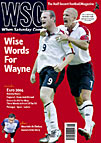 In three weeks Greek football went from purgatory to paradise, but Paul Pomonis is not sure whether the euphoria will survive Colin Moynihan being called in for advice
In three weeks Greek football went from purgatory to paradise, but Paul Pomonis is not sure whether the euphoria will survive Colin Moynihan being called in for advice
“Greeks always exaggerate, whether in sorrow or in joy,” was Otto Rehhagel’s rather unkind remark when, minutes after the Euro 2004 final, a Greek TV reporter asked him to comment on the explosion of mass euphoria that greeted his team’s astonishing crowning as European champions. Anxious to preserve his seasoned pro image, King Otto had for once got it wrong. If anything, even in jubilation both players’ and fans’ reactions to the “fairytale of Portugal” were characterised by stunned incredulity and down to earth realism. “How on earth did you pull such a stunt?” a reporter asked striker Demis Nikolaides a few hours after the final. “I have no idea,” came the honest reply, while scorer Angelos Charisteas urged the fans back home to party on as “they would most probably never experience anything remotely similar in their lifetimes”.
